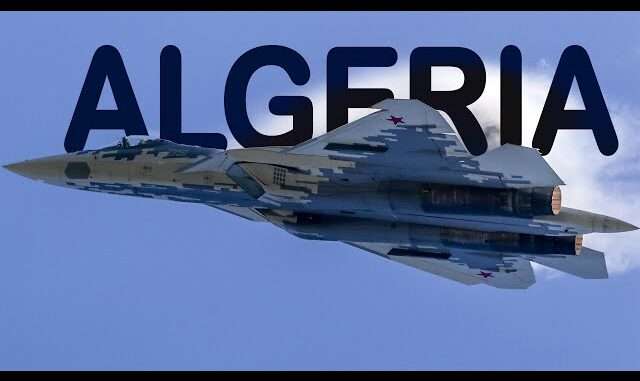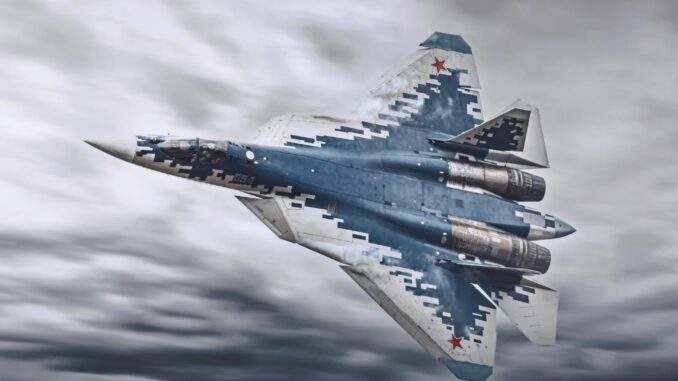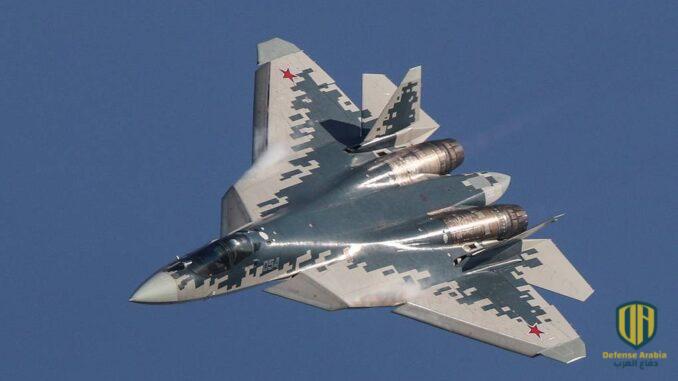
Mohammad Hassan Sangtarash- Independent Researcher in Defense-Security Strategies in International Relations
Algeria, as Africa’s energy hub for Europe, has a history of tensions with France, Spain, and Italy. The delivery of the fifth-generation Su-57 fighter jet, along with 4++ generation Su-35 fighters, to this Arab-Muslim country, located near key NATO members, could significantly strengthen Algeria’s position as a strategic player in the region. This development not only has major implications for Arab-Western relations—particularly with Egypt and Morocco—but could also turn Algeria into a “new Russia” south of Europe’s borders (Kofman & Kendall-Taylor, 2023).
“The Sukhoi Su-57 is a Russian-made, fifth-generation, multirole stealth fighter aircraft capable of engaging aerial, land, and naval targets. This aircraft boasts an operational range of 1,500 to 3,500 kilometers and utilizes advanced avionics, including an active electronically scanned array (AESA) radar.
To bolster its defense capabilities, gain access to cutting-edge technologies, and enhance the operational readiness of its military forces, Algeria has placed an order for 14 Sukhoi Su-57 aircraft, making it the inaugural foreign customer. Part of this order has already been delivered.
Geopolitical Tensions Between Algeria, Europe, and Morocco
In 2021, Algeria severed its natural gas pipeline through Morocco to Spain due to political disputes, opting instead to use the Medgaz pipeline (Boubekeur, 2022). Simultaneously, Algeria and Spain have longstanding territorial disputes over the cities of Ceuta and Melilla, as well as maritime boundaries (Zoubir, 2021).
Although Algeria does not seek to seize Ceuta and Melilla, it strategically exploits the dispute between Morocco and Spain over these two cities and supports Morocco’s position, contending that these cities should be returned to Morocco. Algeria asserts that Spain’s presence in Ceuta and Melilla is a remnant of the colonial era that must come to an end. Yet, at times—and driven by competition with Morocco—it has, in an indirect manner and through diplomatic silences, rendered political support to Spain.
Meanwhile, France, Spain, and Israel support Morocco, while Algeria backs the Polisario Front in Western Sahara (Joffe, 2020). Algeria’s military buildup will not only shift the balance of power in North Africa but may also indirectly empower its allies, potentially impacting proxy forces in the region, including near the Strait of Gibraltar. This scenario bears a resemblance to the Houthis’ influence in Yemen and their control over the Bab el-Mandeb Strait (Miller, 2023).

Strengthening Algeria’s Position in the Islamic World
Algeria’s role in the Islamic world will also be enhanced by its military advancements. The Islamic world can be broadly divided into three key regions:
Eastern Asia: Including countries like Indonesia, which are significant in terms of population (Ahmad, 2022).
The Central Region (Theoland): Encompassing the Middle East, holy cities, and vast oil and gas resources (Nasr, 2021).
The Western Region: Covering North Africa, which is adjacent to Europe and historically served as Islam’s gateway to Andalusia (Esposito, 2020).
Algeria, positioned in the Western Islamic world, could see its geopolitical influence grow substantially through its military expansion. For example, this could heighten its involvement in the Libyan crisis (Lacher, 2022).
The Libyan conflict involves multiple actors: Egypt, the UAE, and Russia support Khalifa Haftar, while Italy and Turkey back the Government of National Accord (GNA). France, the U.S., and China have complex, multifaceted positions on the issue (Wehrey, 2020).
Unlike Egypt and the UAE, which have provided military support to Haftar, or Turkey, which has assisted the GNA, Algeria has maintained a neutral stance focused on diplomacy. It has consistently sought to mediate, prevent foreign intervention, and reinforce border security. However, given its recent procurement of advanced military assets like 4++ generation and fifth-generation fighters, Algeria may wield greater influence in both the region and the broader Islamic world (Zoubir, 2023).

Russia’s Strategy Against NATO and Europe
On the global stage, Russia’s decision to sell Su-57 jets to Algeria represents a major strategic move. This comes after Egypt, under U.S. pressure, canceled its purchase of Su-35s, leaving those aircraft in Russia to be sold to Algeria or other buyers (Gorenburg, 2023). This shift raises concerns for Egypt, as it now faces a security dilemma: in the east, Israel possesses F-35 fighters, and in the west, Algeria is acquiring Su-35 and Su-57 jets, potentially eroding Egypt’s aerial defense superiority (Cordesman, 2023).
Meanwhile, European nations have yet to develop their own fifth-generation fighter jets and remain dependent on the American-made F-35 for air superiority. Currently, France relies on the Rafale, while Italy and Spain operate Eurofighter Typhoons to safeguard European airspace. However, these countries face new challenges:
Escalating geopolitical tensions in Eastern Europe (Kagan, 2023).
A weakening air superiority stance compared to Algeria and Russia, both of which now possess fifth-generation fighters (Bentley, 2022).
Europe’s Security Challenges and Its Future Outlook
At the same time, the resurgence of Donald Trump’s nationalist policies has reignited European discussions about an independent European military force. The PESCO project, designed as a step toward this goal, has gained renewed interest (Fiott, 2023). While Europe does not want to weaken NATO, excessive reliance on U.S. security support poses a strategic risk, leading the EU to seek greater defense autonomy (Lindley-French, 2022).
Conclusion
The sale of Su-57 fighter jets to Algeria has reshaped the balance of power in Southern Europe and North Africa. This deal has not only surprised NATO’s key European members—Italy, France, and Spain—but has also placed Morocco and Egypt in a difficult position. Egypt, a buyer of French Rafale fighters, now faces a regional landscape where two countries possess fifth-generation aircraft: Israel with F-35s and Algeria with Su-57s (Barrie, 2023).
This development signifies a major shift in airpower balance in the region, with long-term implications for Europe’s security strategies, NATO’s positioning, and the defense policies of Arab states (Schneller, 2023).
References
Ahmad, M. (2022). The Strategic Influence of Southeast Asian Nations. Oxford University Press.
Barrie, D. (2023). Regional Military Balances and Airpower Trends. IISS.
Bentley, P. (2022). Fifth-Generation Fighter Developments and Global Airpower. RAND Corporation.
Boubekeur, A. (2022). Algeria’s Energy Politics and European Relations. Brookings Institution.
Cordesman, A. H. (2023). Military Modernization in the Middle East. CSIS.
Esposito, J. (2020). Islam and the West: A Historical Perspective. Cambridge University Press.
Fiott, D. (2023). PESCO and the Future of European Defense. European Council on Foreign Relations.
Gorenburg, D. (2023). Russia’s Military Strategy in North Africa. Harvard University Press.
Joffe, G. (2020). North Africa and European Security. Routledge.
Kagan, R. (2023). The Geopolitical Shifts in Europe and NATO’s Role. Brookings Institution.
Kofman, M., & Kendall-Taylor, A. (2023). Russia’s Military Export Strategy and its Impact on NATO. Center for a New American Security.
Lacher, W. (2022). Libya’s Political and Military Dynamics. Carnegie Endowment for International Peace.
Lindley-French, J. (2022). Europe’s Strategic Autonomy: Reality or Fiction? Chatham House.
Miller, A. (2023). Proxy Conflicts in the Middle East and North Africa. CFR.
Nasr, V. (2021). Islamic Geopolitics and Energy Resources. Princeton University Press.
Schneller, A. (2023). NATO’s Challenges in a Multipolar World. IISS.
Wehrey, F. (2020). Libya and Foreign Interventions. Oxford University Press.
Zoubir, Y. H. (2021). Algeria and Spain: A History of Conflict and Cooperation. Routledge.






Be the first to comment